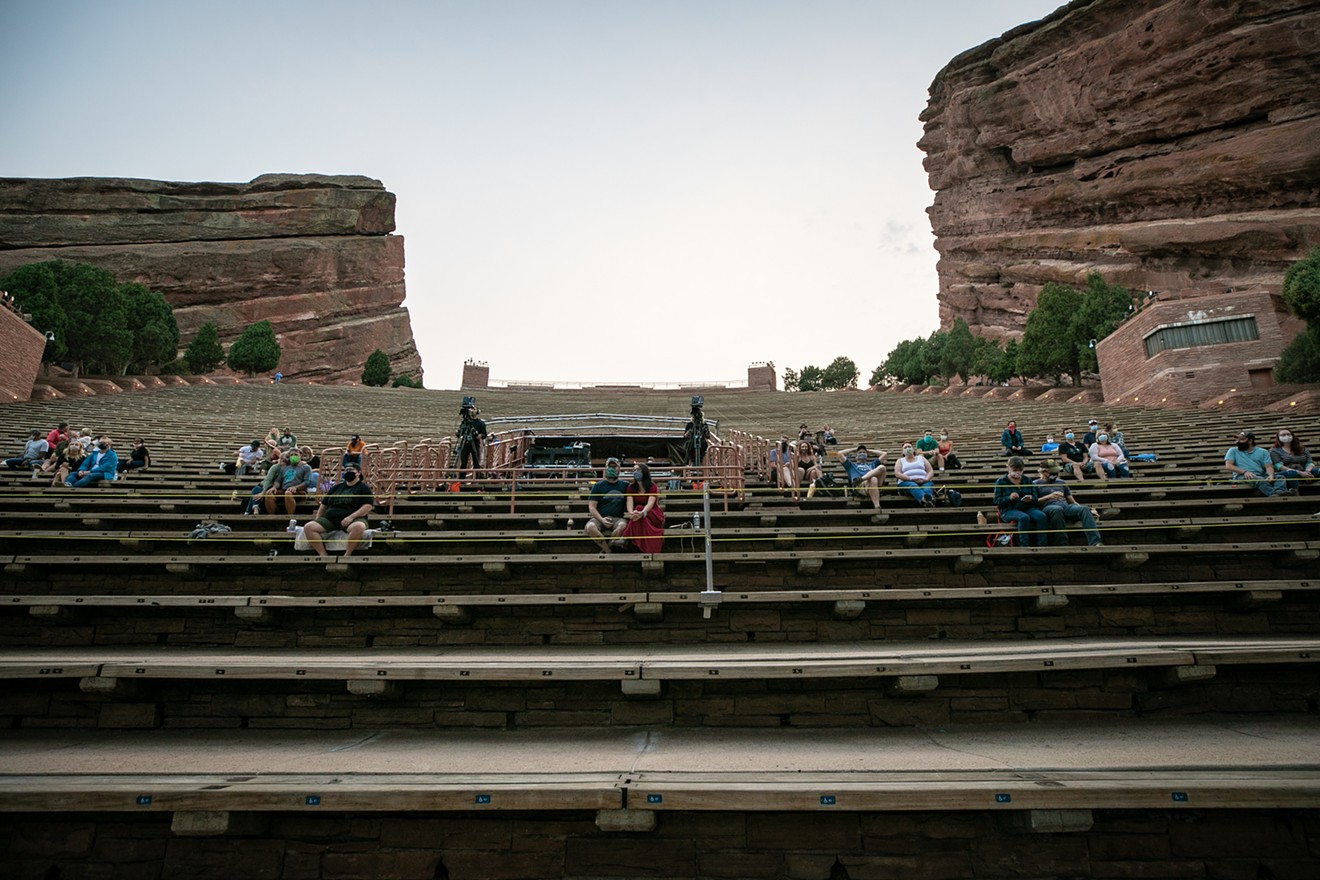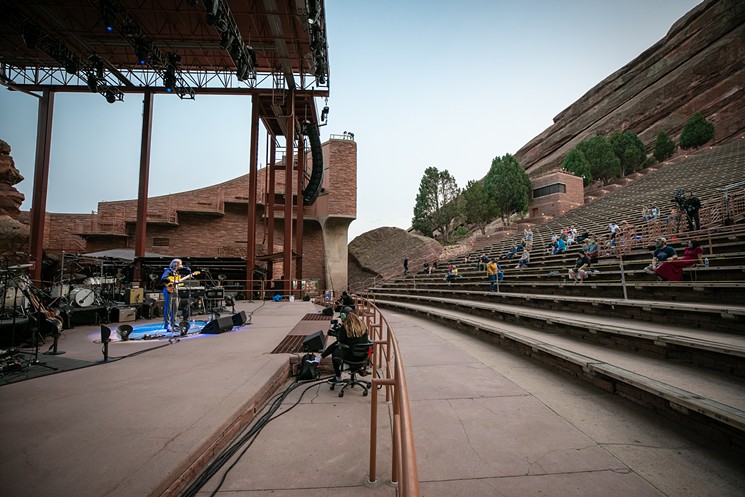“Do we have to wear our masks the whole time?”
The question came from a grumpy boomer with a thin-blue-line American flag mask concealing his chiseled face on September 15, as he walked into the first night of Nathaniel Rateliff’s mid-pandemic five-show stand at Red Rocks.
“Yes,” said the sole AXS worker manning the laptop and addressing ticketing issues for the 175 people slowly trickling in.
The fan and his date had just walked through a gauntlet of outspoken progressives from Rateliff’s private foundation, the Marigold Project, who were handing out fliers asking for donations. Now he was being told how to dress. His eye roll suggested that this single employee was part of a deep state conspiracy to strip him of his God-given freedoms. On the brink of a temper tantrum, he managed to rein it in.
This flag-wearing fellow must really love Rateliff’s music. Why else would he show up for the activist singer, whose proceeds from the concert series are going to fund progressive organizations around the country? The same singer who earlier this summer helped launch a boycott of the nonprofit-owned Fiddler’s Green Amphitheatre and marched alongside Black Lives Matter to change a Greenwood Village policy that shields its police officers from taking financial responsibility when they abuse their power?
The cop-boosting fan took another deep breath, stifling his irritation at the mask ordinance. He moved a few feet away before turning around and asking another question about his face covering: “Even at our seats?
“Yes,” the patient worker said.
“And how does seating work?”
The worker explained: Fans sit every other row, at least six feet apart. It’s all general admission. Masks must be worn at all times.
“Do I have to sit six feet from her?” the fan asked, pointing to his date. (What a kidder!)
“No,” said a bemused Red Rocks security guard who heard this exchange. “You’re from the same house.”
“Just asking,” he said.
“She probably wants to stay six feet away from him,” said a nearby woman, pointing to the man’s date, who was barely out of earshot.
Make that twenty feet. And in the 9,525-plus-seat amphitheater, that would be possible.
When compared to restaurants and bars, where people are relatively close together, or even museums, Red Rocks' 175-person cap seems overzealous on the part of the state. Most of the fans were in the first twenty or so rows, all wearing masks and spaced far enough apart to abide by all social-distancing guidelines. The two security guards walking around the venue throughout the show made sure of it. But there were still roughly fifty empty rows above them that could have seated hundreds of people under guidelines far stricter than those recommended by the Centers for Disease Control.
It's no wonder that some people in the music industry are irate with Governor Jared Polis for making an exception to the state's 175-fan limit for the Denver Broncos while doing next to nothing to bring back shows or otherwise help people whose livelihoods depend on concerts happening.
The workers at Red Rocks were grateful for the gigs; most of those I spoke to hadn’t been back to the venue since Winter on the Rocks on January 31. Like nearly everybody in the concert industry — from security, ticket takers and sound engineers to stage hands, office workers and promoters — they had all been out of a job. And now so are many at Denver Arts & Venues, the city agency that runs Red Rocks: At the end of the month, it will be furloughing most of its employees until early 2021, and Red Rocks itself will be mothballed later this year. Seeing the few workers hired for the Rateliff show was cold comfort when thinking about the thousands not at work, wishing their shows would go on.
The concert itself was a funereal affair. Both opener Kevin Morby and Rateliff are known for rambunctious sets that inspire people to dance, drink and scream along. Neither brought that.
Morby — whose most recent show in Denver was a sweaty, raucous gig at the Bluebird Theater — sounded angelic, playing alone, then with Katie Crutchfield of Waxahatchee, as well as Rateliff and his band. Like everyone else, Morby was grateful to be at Red Rocks, but also more somber than usual as he played songs like “Harlem River” and “I Have Been to the Mountain.”
“It’s been a crazy year to be a musician,” he told the audience. No kidding. It's been a crazy year to be alive.
Between sets, AEG bigwig Don Strasburg took the mic and expressed his gratitude for the fans, the team putting on the show, and the musicians.
“It’s really nice to be here,” he said with reverence. “It's kind of our own private show.” He expressed his appreciation for people following the rules, as well as everybody else involved with the event. “If we can show people that we can behave, we will be back on stage.”
Then it was time for Rateliff to play. His team had promised a full production and it delivered, with smoke, moody lighting and video projections on the rocks behind the stage. Yet the local singer-songwriter turned global star brought an even more somber mood to the stage than had Morby.
The set opened with cacophonous noise that led into a string quartet playing dissonant chords as Rateliff crooned. While many in the crowd called out for him to play Night Sweats hits, he mostly stuck to brooding, melancholy music about depression, romantic failure and addiction. It was the right move.
If Rateliff counted ghosts among his fans, it would have been a full house. Instead, the emptiness of the venue was a ceaseless reminder of those who have died from the coronavirus. And the pandemic was never far from Rateliff’s mind.
“Thank you all coming out here and being safe,” he said. “I wish it was under different circumstances, but it’s been a blessing to be here with you all.”
When an audience member shouted out, “You’re killing it,” Rateliff asked, “What?” She repeated herself.
“COVID is literally killing a lot of things,” he replied, offering a bit of the gallows humor that surviving this awful era demands. “Sorry. That was bad.”
He made his way through a number of songs off his new solo album, And It’s Still Alright, along with plenty of songs from his earlier solo albums, including the nearly perfect You Should’ve Seen the Other Guy. And he did play a few Night Sweats numbers, but mostly the sullen ones.
Still, Rateliff sprinkled a few moments of levity through the night, particularly before the depressing song “Kissing Our Friends,” which is at once a declaration of love and loneliness. “I wrote this song for my lady friend and then realized it sounds like it’s about polyamory,” he said, awkwardly giggling. “Monogamy is so old-school.”
People expecting a Night Sweats show might have been unsettled by the slower, sadder music that Rateliff has spent most of his life making. But fans embraced the show for what it was — a perfect time to bring out quiet songs. We are in a collective state of grief, and the singer knows it. But he also knows how to comfort us: not through distraction, but shared sorrow.
Even Rateliff's finale, “Rush On,” a tribute to his late friend producer Richard Swift, was mournful. The song culminated with a disconcerting wail, suggesting that this moment we’re living through comes with no peace, no release, no culmination. Traces of that echoed as he and his band walked off stage, and fans, most still wearing their masks, filed out, better off for an unforgettable evening in unforgiving times.
[
{
"name": "Air - MediumRectangle - Inline Content - Mobile Display Size",
"component": "12017618",
"insertPoint": "2",
"requiredCountToDisplay": "2"
},{
"name": "Editor Picks",
"component": "17242653",
"insertPoint": "4",
"requiredCountToDisplay": "1"
},{
"name": "Inline Links",
"component": "18838239",
"insertPoint": "8th",
"startingPoint": 8,
"requiredCountToDisplay": "7",
"maxInsertions": 25
},{
"name": "Air - MediumRectangle - Combo - Inline Content",
"component": "17261320",
"insertPoint": "8th",
"startingPoint": 8,
"requiredCountToDisplay": "7",
"maxInsertions": 25
},{
"name": "Inline Links",
"component": "18838239",
"insertPoint": "8th",
"startingPoint": 12,
"requiredCountToDisplay": "11",
"maxInsertions": 25
},{
"name": "Air - Leaderboard Tower - Combo - Inline Content",
"component": "17261321",
"insertPoint": "8th",
"startingPoint": 12,
"requiredCountToDisplay": "11",
"maxInsertions": 25
}
]
















